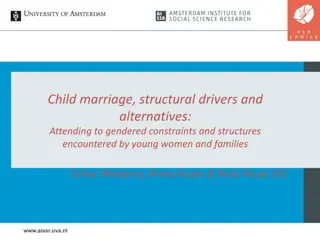
Emic and Etic Concepts in Cross-Cultural Studies
Explore the concepts of Emic and Etic in culturally specific and cross-cultural studies, where Emic focuses on understanding cultures from within, and Etic involves comparing cultures to find universal behaviors. Discover how these approaches help analyze culturally specific phenomena and cross-cultural similarities.
Download Presentation

Please find below an Image/Link to download the presentation.
The content on the website is provided AS IS for your information and personal use only. It may not be sold, licensed, or shared on other websites without obtaining consent from the author. If you encounter any issues during the download, it is possible that the publisher has removed the file from their server.
You are allowed to download the files provided on this website for personal or commercial use, subject to the condition that they are used lawfully. All files are the property of their respective owners.
The content on the website is provided AS IS for your information and personal use only. It may not be sold, licensed, or shared on other websites without obtaining consent from the author.
E N D
Presentation Transcript
Culturally Specific and Cross- Cultural Studies Emic and Etic Concepts
Emic = (m) = mono = one Etic = (t) = two or more
Definitions Etic Concept An explanation used to understand a culture in scientific terms by comparing the culture to others and addressing the universals of human behaviour Emic Concept Accounts, descriptions and explanations used to understand a culture in its cultural context. It is an attempt to learn the concepts of a culture and see the world the way they do.
Etic Approach Comparing two more cultures in a cross-cultural approach Can be used as an attempt to find cross-cultural similarities in behaviour or universal behaviours Examples: Bond and Smith meta-analysis of conformity WHO study on depression Levine s study on prosocial behaviour
Emic Approach An attempt to study culturally specific phenomena (behaviour relevant to one culture) Examples: Bartlett s observations of the Swazi herdsmen Hopi (Native American) Depression Papua New Guinea
How is it an example of an etic approach? Compares across different cultures Who was involved? Switzerland; Japan; Canada; Iran What were the four culturally similar symptoms? Sadness; joylessness; anxiety; sense of insufficiency What were the culturally specific symptoms? Chinese participants more somatic symptoms; 40% displayed symptoms not in the diagnostic scheme used (thus; culture plays a role in the expression of depression symptoms)
Emic: Native American Depression What were the five illness categories of depression for the Hopi people? Worry sickness; unhappiness; heartbroken; drunken-like craziness; disappointment What was one culturally specific behaviour discovered in this study? The patterns of symptoms for being heartbroken were different to Western cultures






















